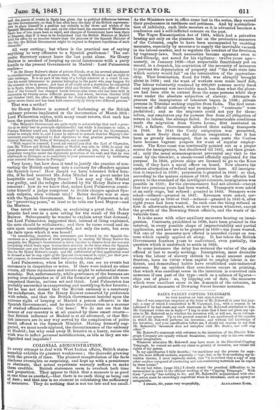BAIN'S PATENT COPYING TELEGRAPH.
TO THE EDITOR OF THE SPECIATOB:
Son—I was somewhat surprised at the letter of Mr. Bakewell in your last jour- nal; a copy of which I transmitted to W. Carpmael, Esq., with a request to be informed if he had made any such statement as Mr. Bakewell attributed to him. Mr. Carpmael writes me in reply—" I bag to state that I have not given any opi, nion to Mr. Bakewell as to whether his invention will, or will not, be an infringe, ment of yonr patent. Up to the present moment I am uninformed of the manner in which Mr. Bakewell performs his invention' and without full knowledge of his invention, and your specification before me,I should not venture to say that Mr. Bakewell's 'invention does not interfere with Mr. Bain's, nor with any other.'"
Mr. Bakewell's statement with reference to the intentions of the Electric Tele- graph Company are equally without foundation, existing only in his own enthu- siastic imagination.
Whatever alteration Mr. Bakewell may have made in the Electrical Copying Telegraph, he cannot set aside my claim to priority of invention, nor vitiate the rights of my patent.
In my specification I fully described the machinery and the process for copy- ing the meet difficult surfaces, especially of type; but, so far from confining my in- vention thereto, I most expressly. stated, that "it is evident that a copy of any other surface composed of conducting and non-conducting materials can be copied by these means."
In my last letter, (page 5640 I clearly stated the practical difficulties to be surmounted in order to the efficient working of the "Copying Telegraph." With these "gravity" has nothing to do; and Mr. Bakewell's acquaintance with elec- tric action must be exceedingly superficial when he introduces such an agency as antagonistic.


























 Previous page
Previous page